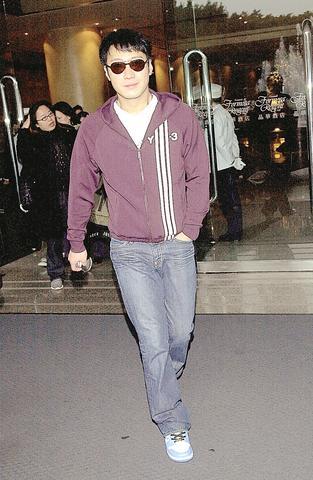Jay Chou's (
Over the past three years, even stridently pro-Taiwan performers have hot potatoed invitations from A-bian. Commenting on this issue, the Liberty Times (
Whether record labels are going to be moved by the paper's high-minded patriotism or any other political consideration is doubtful. But Jay's bosses have probably read the tea leaves and realized that he essentially can do whatever he wants, because so many business interests in China rely on Jay that even the Communist Party couldn't shut him out. And this doesn't even take into account the hundreds of millions of teenie boppers who might take to arms if their hero is barred from the country. So, chances are, Jay can wave an A-bian flag and still earn some Renminbi.

PHOTO: TAIPEI TIMES
Jay also gets to wear the crown this year for being the top-selling artist in Taiwan, having moved 333,000 copies of his Ye Hui-mei (
Since Jolin's heavily publicized flash-in-the-pan fling with Jay, she's found herself tangled in several relationship webs, the latest of which is her connection to TV show host Little Pig (
A similar drama unfolded in Hong Kong last week when Leon Lai (黎明) and Shu Qi (舒琪) were reported to have separated for the n-th time -- on this occasion because Faye Wong (王菲) and Leon were rumored to have hooked up since the Mando-pop diva's breakup with Nicholas Tse (謝霆鋒) a few weeks ago. According to China Times Weekly (時報周刊), Shu Qi hasn't been able to win a long-term commitment from Leon because his father disapproves of her history as a celebrated soft-core porn actress and refuses to even meet her.

PHOTO: TAIPEI TIMES

The unexpected collapse of the recall campaigns is being viewed through many lenses, most of them skewed and self-absorbed. The international media unsurprisingly focuses on what they perceive as the message that Taiwanese voters were sending in the failure of the mass recall, especially to China, the US and to friendly Western nations. This made some sense prior to early last month. One of the main arguments used by recall campaigners for recalling Chinese Nationalist Party (KMT) lawmakers was that they were too pro-China, and by extension not to be trusted with defending the nation. Also by extension, that argument could be

Aug. 4 to Aug. 10 When Coca-Cola finally pushed its way into Taiwan’s market in 1968, it allegedly vowed to wipe out its major domestic rival Hey Song within five years. But Hey Song, which began as a manual operation in a family cow shed in 1925, had proven its resilience, surviving numerous setbacks — including the loss of autonomy and nearly all its assets due to the Japanese colonial government’s wartime economic policy. By the 1960s, Hey Song had risen to the top of Taiwan’s beverage industry. This success was driven not only by president Chang Wen-chi’s

Last week, on the heels of the recall election that turned out so badly for Taiwan, came the news that US President Donald Trump had blocked the transit of President William Lai (賴清德) through the US on his way to Latin America. A few days later the international media reported that in June a scheduled visit by Minister of National Defense Wellington Koo (顧立雄) for high level meetings was canceled by the US after China’s President Xi Jinping (習近平) asked Trump to curb US engagement with Taiwan during a June phone call. The cancellation of Lai’s transit was a gaudy

The centuries-old fiery Chinese spirit baijiu (白酒), long associated with business dinners, is being reshaped to appeal to younger generations as its makers adapt to changing times. Mostly distilled from sorghum, the clear but pungent liquor contains as much as 60 percent alcohol. It’s the usual choice for toasts of gan bei (乾杯), the Chinese expression for bottoms up, and raucous drinking games. “If you like to drink spirits and you’ve never had baijiu, it’s kind of like eating noodles but you’ve never had spaghetti,” said Jim Boyce, a Canadian writer and wine expert who founded World Baijiu Day a decade